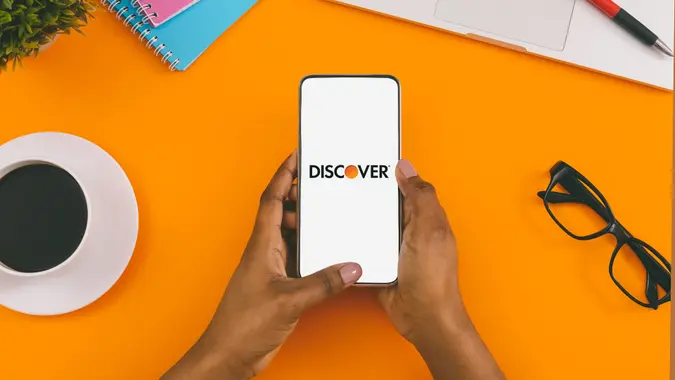What Is a No-Penalty CD and Is It Right for You?

Commitment to Our Readers
GOBankingRates' editorial team is committed to bringing you unbiased reviews and information. We use data-driven methodologies to evaluate financial products and services - our reviews and ratings are not influenced by advertisers. You can read more about our editorial guidelines and our products and services review methodology.

20 Years
Helping You Live Richer

Reviewed
by Experts

Trusted by
Millions of Readers
A no-penalty certificate of deposit (CD) is a type of time deposit investment that allows you to withdraw the full balance without paying a penalty. Keep in mind that you have to keep the funds in the CD for a minimum of the lock-in period to forego the penalty.
No-Penalty CD: Quick Facts
Feature Details Annual percentage yield (APY) Fixed for a higher term Deposit term 3 to 12 months Minimum deposit $500 to $1,000 FDIC or NCUA insurance Usually yes
Withdrawal Rules for No-Penalty CDs
- No penalty for early withdrawal: Early withdrawal is allowed as long as you are past the lock-in period.
- Partial withdrawals: Withdrawal policy varies by bank. Some banks require you to close the CD to withdraw the amount.
- No loss of interest: You keep all the interest earned up to the withdrawal date.
Are No-Penalty CDs Liquid?
A liquid investment is one that’s fast and easy to convert to cash. No-penalty CDs qualify. Although you’ll typically have to wait at least seven days to avoid an early-withdrawal penalty, you can go to your bank any time after that and take out your money.
That said, no-penalty CDs are slightly less liquid than savings accounts and money market accounts. That’s because all CDs are time deposit accounts, meaning they have time restrictions on accessing the funds — even if it’s just seven days.
Savings and money market accounts, on the other hand, have no maturity periods, so you can withdraw some or all of your money whenever you want, without notice.
Liquidity Comparison Table
| Account Type | Liquidity | Early Withdrawal Penalty | Partial Withdrawals | APYs | Minimum Deposit | FDIC/NCUA Insured? |
|---|---|---|---|---|---|---|
| No-penalty CD | Liquid once lock-in period passes — usually 7 days | Not after the 7 day period | Usually not allowed | Higher than savings, lower than regular CDs | $500 to $1,000 | Yes |
| Traditional CD | -Not liquid -Will pay withdrawal penalty |
Yes | Not allowed | Highest if held to term | $500 to $1,000 | Yes |
| High-yield savings account | -Highly liquid -Can access at any time |
No | Yes | Competitive, but lower than CDs | $0 | Yes |
Pros and Cons of No-Penalty CDs
Like any investment, there are benefits and drawbacks. Here’s a look at both sides of no-penalty CDs:
Pros
- No early withdrawal penalty
- Higher interest rate than savings accounts
- Good for short-term goals
- FDIC or NCUA insured up to $250,000 per depositor per institution
Cons
- Lower APYs than traditional CDs
- Limited availability
- Not as liquid as savings accounts
- APY not worth it for small balances
Top Banks Offering No-Penalty CDs
Below is a list of financial institutions with the best no-penalty CDs.
| Bank | APY | Details |
|---|---|---|
| Ally Bank | -Term: 11 months -Minimum deposit: None -Withdrawals allowed: One full balance withdrawal |
|
| CIT Bank | -Term: 11 months -Minimum deposit: $1,000 -Withdrawals allowed: One full balance withdrawal |
|
| Bank of America, Member FDIC | -Term: 12 months -Minimum deposit: $1,000 -Withdrawals allowed: One full balance withdrawal |
|
| Marcus at Goldman Sachs | -Term: 7 months -Minimum deposit: $500 -Withdrawals allowed: One full balance withdrawal |
How To Choose the Best No-Penalty CD
Choosing the best no-penalty CD means taking a look at minimum deposits, APYs, terms and other factors.
- Minimum deposit: You want to choose a no-penalty CD with a low minimum deposit, like $500.
- APYs: Look for the highest CD rates you can find. Aim to find a no-penalty CD with a 3.50% APY or higher.
- Insurance: Find an institution where the CD will be FDIC-insured or NCUA-insured.
- CD terms: Usually, no-penalty CDs have a term from 3 to 12 months. Find a CD term that aligns with your goals.
- Withdrawal rules: Check how soon you can access funds without a penalty, whether partial withdrawals are allowed and if closing the account is required.
Who Should Consider a No-Penalty CD?
Although no-penalty CDs sound like they provide depositors with the best of both worlds, the trade-off is a reduced interest rate. However, the benefit of a no-penalty CD may outweigh the cost of the lower interest rates if you might need to access the money in your CD before the account matures — whether to finance an unexpected home purchase or a car repair or to get you through a financial emergency.
It’s also a good idea to weigh the pros and cons of a no-penalty CD against even more liquid accounts such as high-yield savings and money market accounts. These accounts don’t have guaranteed fixed rates like no-penalty CDs do. However, they’re fully liquid, so you can always take your money out if rates drop, then put it in a CD.
Final Thoughts: Are No-Penalty CDs Worth It?
No-penalty CDs are a better investment than savings accounts and can be liquidated after waiting the requisite seven days. No-penalty CDs are a smart investment if you want to earn interest, but want the flexibility of pulling your money in less than a year.
No-Penalty CD FAQ
Still have questions about no-penalty CDs? Here’s what you need to know.- Is a CD considered a liquid asset?
- Not usually. Your money is locked for a specific term with a CD, and if you choose to withdraw early, you will incur a penalty. A no-penalty CD is semi-liquid.
- What's the difference between a no-penalty CD and a liquid CD?
- A no-penalty CD has the following features:
- Withdrawal without penalty after the lock-in period
- More commonly offered by banks
- Better for full withdrawal access
- A liquid CD allows limited withdrawals, rates are usually lower and are less common than other CD offerings.
- A no-penalty CD has the following features:
- Are no-penalty CDs a good idea?
- In certain situations, a no-penalty CD is a good idea. In general, CDs are good when you need a higher rate than a savings account and you don't need immediate access to your money.
- Is it worth putting money in a CD right now?
- If you want higher yields than a savings account and guaranteed returns, a CD is a good investment for you.
- Can you cash out a CD without penalty?
- Only in certain situations. You can cash out a CD at maturity, or if you have a no-penalty CD and the lock-in period has passed.
Ellie Diamond, Daria Uhlig and Cynthia Bowman contributed to the reporting for this article.
Data is accurate as of July 18, 2025, and is subject to change.
Editorial Note: This content is not provided by any entity covered in this article. Any opinions, analyses, reviews, ratings or recommendations expressed in this article are those of the author alone and have not been reviewed, approved or otherwise endorsed by any entity named in this article.
Our in-house research team and on-site financial experts work together to create content that’s accurate, impartial, and up to date. We fact-check every single statistic, quote and fact using trusted primary resources to make sure the information we provide is correct. You can learn more about GOBankingRates’ processes and standards in our editorial policy.
 Written by
Written by  Edited by
Edited by 

























